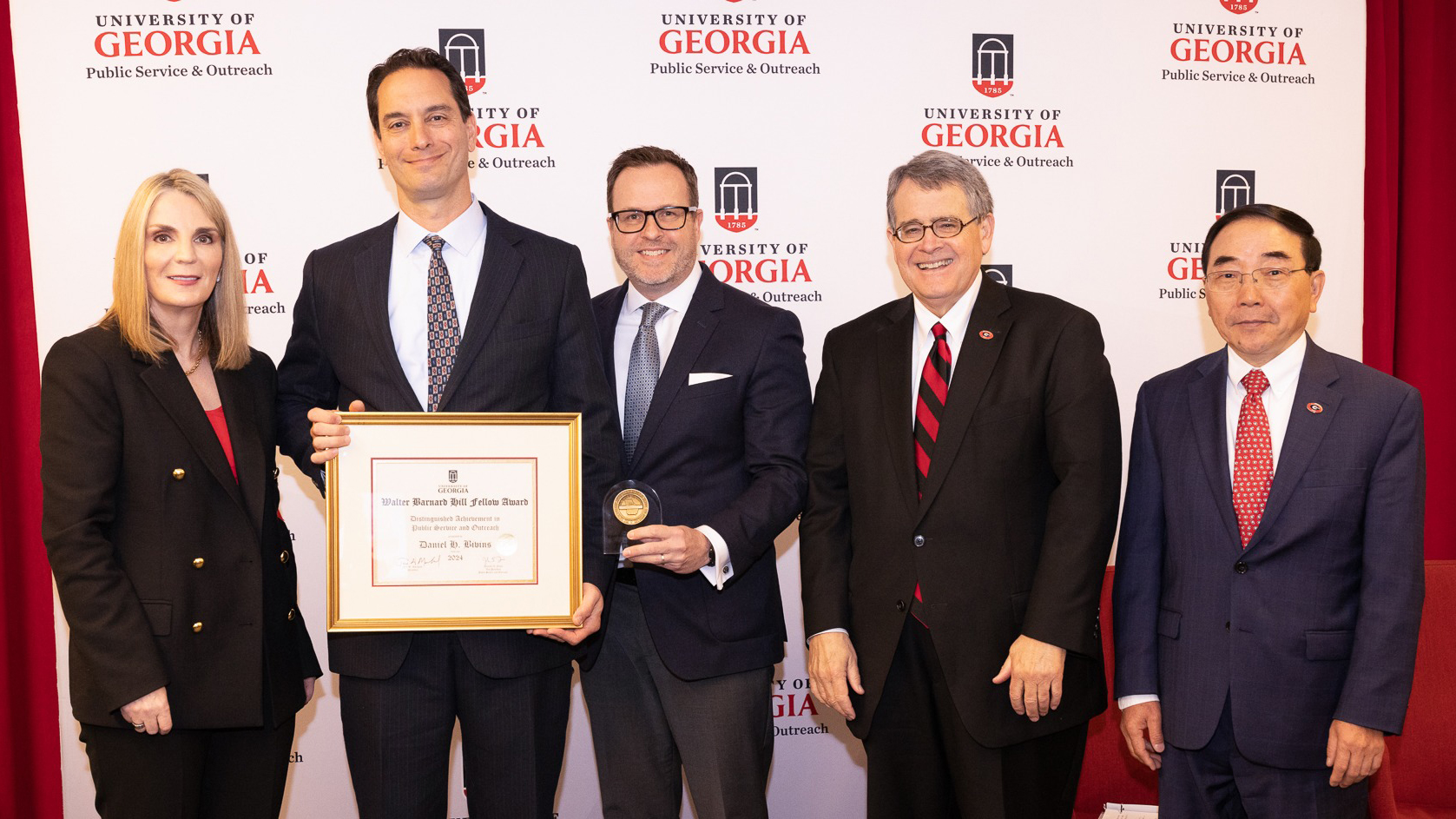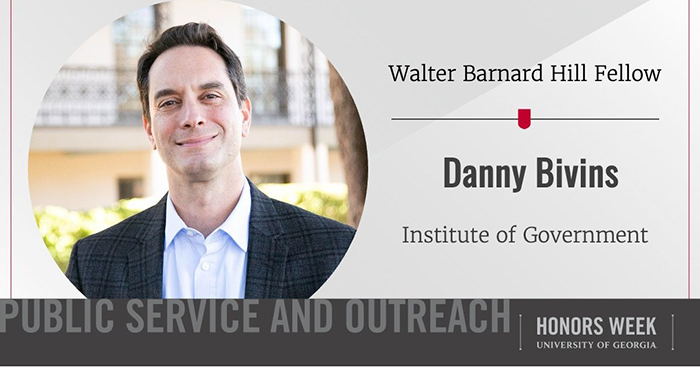Danny Bivins has been honored with the 2024 Walter Barnard Hill Fellow Award for Distinguished Achievement in Public Service and Outreach. A UGA Institute of Government faculty member, Bivins’ work focuses on partnerships that increase the economic development potential of communities and the state while providing valuable experiential learning opportunities to students. He was awarded the Hill Fellow Award at this week’s 33rd annual Public Service and Outreach Meeting and Awards Luncheon.
The Walter Barnard Hill Fellow Award for Distinguished Achievement in Public Service and Outreach (Hill Fellow Award) is UGA’s highest award in public service and outreach and is comparable to a distinguished professorship. It recognizes sustained, distinguished, and superb achievements in university public service and outreach and contributions to improving the quality of life in Georgia or elsewhere.

(L-R) Jennifer L. Frum, Vice President for University of Georgia Public Service and Outreach; Danny Bivins, Senior Public Service Associate for University of Georgia Carl Vinson Institute of Government; Rob Gordon, Director for University of Georgia Carl Vinson Institute of Government; Jere W. Morehead, President for University of Georgia; S. Jack Hu, Senior Vice President for University of Georgia Academic Affairs and Provost (Photo by Shannah Montgomery)
“This award is not just a recognition of my work, but a testament to the dedication of the Institute of Government and our mission to make Georgia a more prosperous state for all its residents. I am grateful for the opportunity to serve and contribute to the betterment of our communities,” Bivins said.
Before joining the Institute of Government, Bivins served for eight years with UGA’s J. W. Fanning Institute for Leadership Development, where he co-developed the Cities and Downtown: Building Blocks to Recovery Initiative. Prior to joining the Fanning Institute, Bivins served as the program coordinator for the Georgia Historic Resource Survey Program "Find It." There, he helped initiate a joint venture between the University of Georgia, the Georgia Transmission Corporation, and the State of Georgia’s Historic Preservation Division to document Georgia’s historic resources.
Since 2013, Bivins has directed the Georgia Downtown Renaissance Partnership, a statewide downtown revitalization program that addresses design and economic development, drawing on the expertise of public and private organizations and foundations to bring their collective expertise to bear on community needs.
The premier component of the program is the Renaissance Strategic Visioning and Planning (RSVP) Process, through which the institute works with a community to develop its vision for the future and steps for implementation. Since 2013, the institute has worked with communities to develop 25 RSVPs, with implemented plans resulting in more than $220 million of construction, revitalization and other improvements.
Bivins was also a key partner in developing the Georgia Economic Placemaking Collaborative, which focuses on a community’s desirability as a place to live to attract multigenerational talent. Communities receive education, facilitation, technical assistance, peer learning and incentives to identify their assets and develop a locally-based placemaking strategy. Fifteen Georgia cities and counties have been selected so far.
Bivins has created a unique community and economic development approach that uses visual communication to inspire downtown development, engage local and state leadership, and stimulate private and philanthropic investment. Bivins’ programs include experiential learning opportunities for undergraduate and graduate students. In collaboration with three College of Environment and Design (CED) faculty members, he has been instrumental in eight studio courses with 111 students in six Georgia communities.
Their work has not been limited to Georgia. Due to Bivins’ engagement, the private Lyndhurst Foundation has provided $600,000 over eight rounds of funding to the institute to support revitalization projects in rural North Georgia and communities surrounding Chattanooga, Tenn.
“The successes of the partnership and other downtown initiatives are due in no small part to Mr. Bivins’ involvement,” said Larry Hanson, CEO and executive director of the Georgia Municipal Association. “He thinks collaboratively, brings all the right parties to the table to accomplish great results; and his enthusiasm is contagious and inspires others to seek solutions to existing problems.”
About the Award
Comparable to a distinguished professorship, the Walter Barnard Hill Fellow Award for Distinguished Achievement in Public Service and Outreach (Hill Fellow Award) is UGA’s highest award in public service and outreach. It recognizes sustained, distinguished, and superb achievements in university public service and outreach, and contributions to improving the quality of life in Georgia or elsewhere. The selection committee considers long-term achievements, special projects having extraordinary impact, and collaborative efforts. The creativity, impact, and superb nature of a Hill Fellow’s achievements are of a magnitude that greatly exceeds the normal accomplishments of a productive faculty member. The award is named in honor of Chancellor Walter Barnard Hill, who led UGA from 1899 until his death in 1905. Hill first articulated the university’s modern public service and outreach mission. He admired the close relationship that existed between the University of Wisconsin and the state of Wisconsin and led a pilgrimage of nearly 100 Georgians to see the “Wisconsin Idea” in action. As a result of this journey and the power of Hill’s vision, Georgia’s leadership endorsed Hill’s plan for a modern, public service–oriented university and backed that endorsement with increased support for the institution.
